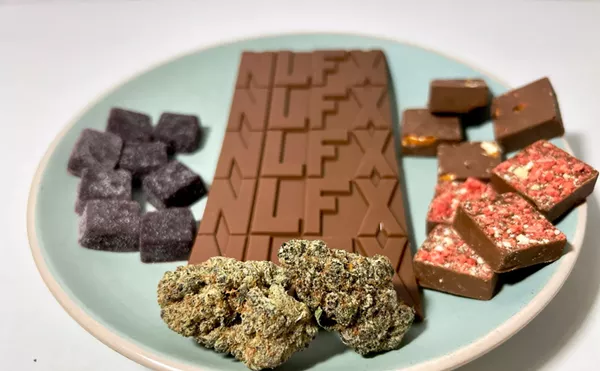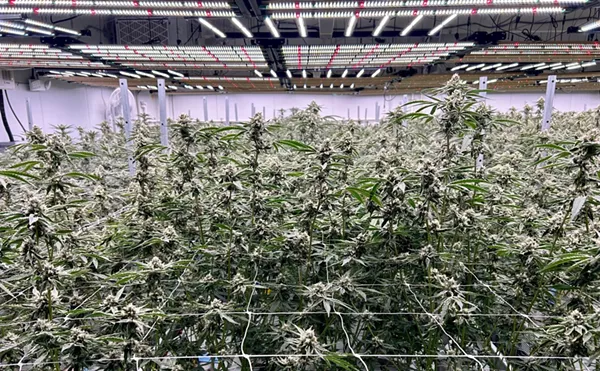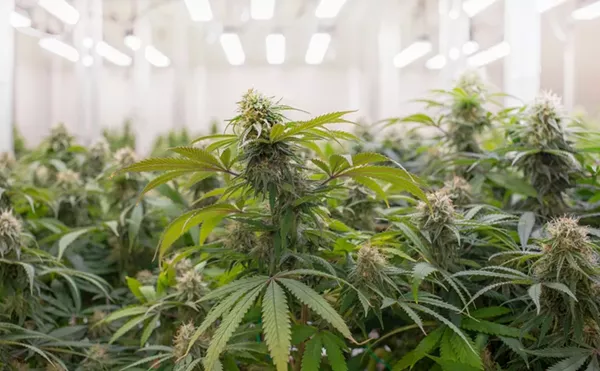
Audio By Carbonatix
[
{
"name": "GPT - Leaderboard - Inline - Content",
"component": "35519556",
"insertPoint": "5th",
"startingPoint": "3",
"requiredCountToDisplay": "3",
"maxInsertions": 100,
"adList": [
{
"adPreset": "LeaderboardInline"
}
]
}
]
It's no longer unusual for mainstream figures to come out in support of legalizing marijuana or against the War on Drugs. Just last month, conservative evangelist Pat Robertson called for an end to marijuana prohibition. Last year, the Global Commission on Drug Policy and the NAACP called for an end to the drug war. Even Michigan state Rep. Rick Olson (R-Saline) has openly questioned official policy and is drafting legislation to decriminalize personal use of marijuana.
"That's my plan, it's just a question of timing," Olson says. "I tend to walk where angels fear to tread."
In my last Higher Ground column, I wrote about Steve D'Angelo, star of cable TV's Weed Wars and proprietor of Harborside Health Center in Oakland, Calif., said to be the world's largest marijuana dispensary, in advance of his appearance at the Ann Arbor Hash Bash. D'Angelo claimed that trend lines in polls have crossed and more people in the United States now support legalizing and regulating marijuana in a manner similar to alcohol and tobacco than oppose it. In fact, national polls show support for legalization of marijuana now hovering around 50 percent. An April Rasmussen poll found 47 percent in favor of legalization with 42 percent opposing it; a 2011 Gallup poll found 50 percent of Americans in favor of legalization with 46 percent opposing.
Given that, it seems inevitable that support for the decriminalization or legalization of marijuana will make a difference at ballot boxes within the next decade — indeed, this November, voters in Washington state and Colorado could make their states the first to legalize pot; both states have well-funded initiative campaigns. A petition drive to put legalization on the Michigan ballot is under way, but there is little money in the effort and the Committee for a Safer Michigan is a long way from the 322,000-plus signatures it needs to get the question on this fall's ballot. Still, the mere fact that we're talking about it evidences a major change in the landscape.
Even with all those indicators, I found it particularly exciting when, a couple of weeks ago, former presidents César Gaviria of Colombia, Ernesto Zedillo of Mexico and Fernando Henrique Cardoso of Brazil released a statement calling for an end to the War on Drugs. It's an eloquent assessment of the effects of the prohibition policy written by people who have literally experienced the war part of the War on Drugs.
"The facts speak for themselves," they wrote. "The foundations of the U.S.-led war on drugs — eradication of production, interdiction of traffic, and criminalization of consumption — have not succeeded and never will. When there is established demand for a consumer product, there will be a supply. The only beneficiaries of prohibition are the drug cartels."
Current presidents Juan Manuel Santos of Colombia, Otto Perez Molina of Guatemala, and Laura Chinchilla of Costa Rica, support the position espoused by these past leaders, and, for a historic first time, put the drug war on the agenda at the Summit of the Americas this past weekend [April 14-15] in Cartagena, Colombia. Nothing substantive came out of the summit, but talking about it at the highest levels of hemispheric governance is a huge step, a logical next step. Argentina, Brazil, Colombia, Ecuador, Mexico and Uruguay have already decriminalized possession of small amounts of marijuana for personal use.
Apparently, U.S. policy no longer has the iron grip it once had on Latin America. Cooperation in the War on Drugs has traditionally been tied to other forms of aid the United States gives these countries. However, the carnage from the War on Drugs has been devastating in some countries where international drug cartels operate with impunity. In Mexico, more than 50,000 people have been killed since Calderon began an offensive against drug cartels in 2006. Last month, U.S. Defense Secretary Leon Panetta counted Mexican drug war deaths at 150,000, although the time period wasn't clear.
A January article on the CNN website by former Colombian Cali drug cartel member Jorge Salcedo details how he bought four 500-pound bombs from a Salvadoran air force colonel for a half-million dollars with the intention of using them against a rival cartel. He also discussed a $100,000 payoff to a captain of Colombia's anti-narcotic task force for helping a cartel leader escape a police raid.
If you think drug trafficking is out of control in the United States, take a look at what's been going on in Latin America, where in some places drug cartels rival and even overwhelm government power.
"Forty years of strenuous efforts have failed to reduce the production and consumption of illicit drugs," the former presidents wrote. "Worse, in Mexico and Central America, prohibition-related violence and corruption have become a major threat to public safety and the stability of democratic institutions. ...The war on drugs has failed, with devastating consequences for individuals and societies throughout the Americas."
In years past, you might occasionally hear a lone government official popping off about the drug war, but a coordinated effort by a group of presidents at a major hemispheric summit was unheard of until now. Latin American officials are calling for an end to the drug war and to treat drug use as a public health problem, citing the approach to tobacco as a model.
"Research has consistently demonstrated that marijuana is a less harmful drug than tobacco or alcohol. ... The stunning reduction in the consumption of tobacco in the Americas shows that prevention and regulation are more efficient than prohibition and punishment."
"The United States has consistently put pressure on other countries and global organizations to fall into step with U.S. drug policy including using the U.S. military to fight transnational drug trafficking," says Morgan Fox, communications director for the Marijuana Policy Project, a Washington D.C.-based organization working to decriminalize marijuana. "Complicity in the global drug war was a prerequisite for other types of aid, particularly in Latin America. It's laudable that they are starting to say, 'Look, this policy is a failure.' It's not taking away from the source of income for cartels, drug sales in the United States. Until we tax and regulate it so that legitimate business people can distribute, these gangs will not be stopped. ... By keeping this business illegal, whenever someone at the top is killed or arrested, it is a job opening that they will be as ruthless and violent as possible in order to secure."
What did our government have to say about the prospect of discussion? While Vice President Joe Biden has admitted that the discussion on legalizing drugs is legitimate, he maintains that legalizing drugs would cause more problems than it solves.
Well, that legitimate discussion should continue. It should include, for instance, the people of Ciudad Juárez. Ciudad Juárez, across the border from El Paso, Texas, had the highest murder rate in the world in 2010 with 3,622 homicides and a population of about 1.3 million; most of those deaths were related to the War on Drugs or traffickers. Tens of thousands people have fled the city in search of safety. I think they may have some choice thoughts to share.
Larry Gabriel is a writer, musician and former editor of Metro Times. Send comments to letters@metrotimes.com.






